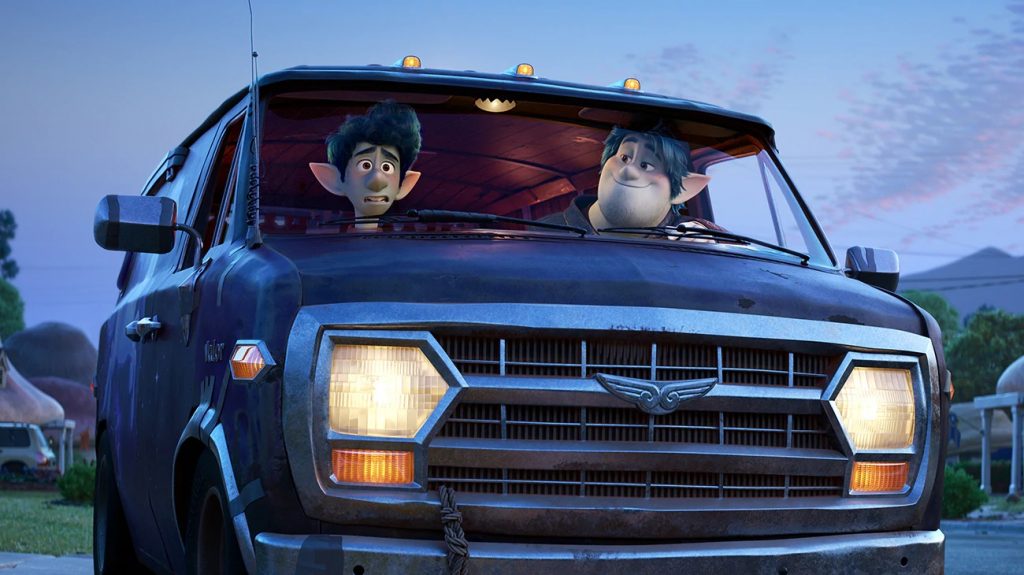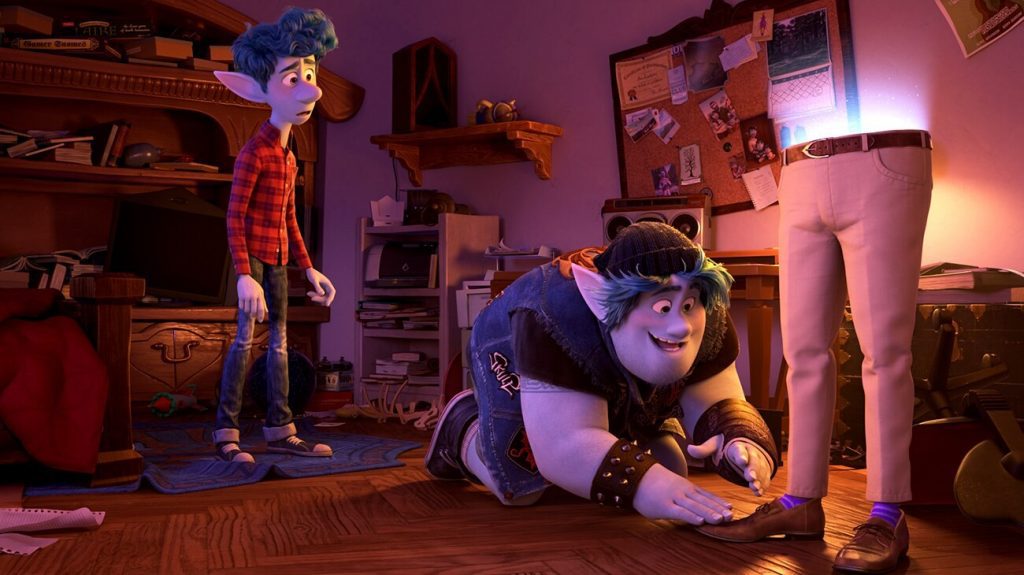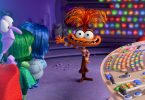Pixar’s latest film Onward releases in theaters this week and features two brothers going on a journey to bring back their deceased father for one day using the magic he left behind. Set against a modern day fantasy backdrop, the animated film is as personal as it is magical for director Dan Scanlon. We had the opportunity to sit down with Onward‘s Head of Story, Kelsey Mann, to discuss bringing the process of bringing Scanlon’s story to life and the challenges and joys they faced in doing so.
Just want to start off and say that I loved the film. I thought it was wonderful.
Kelsey Mann: Really? Oh, that’s wonderful dude. It’s so weird to have it out there now. We’ve been working on it for the longest time so I really appreciate you saying that.
I don’t think people realize how long animated films are in development. It’s crazy.
Mann: Do you know like I took a picture on day one with Dan and Corey and I looked at the date just a couple months ago and it was September 17th of 2013. That was Day 1.
Really? That’s my birthday actually, September 17th.
Mann: That’s amazing! Yeah, years ago man. It’s just that this stuff takes so long.
You don’t realize that, and then the production babies come up in the credits and you realize how long it’s been.
Mann: Yeah, yeah it’s covering the span of many years, you know.


One of the things I love about this film was how much of a personal story it is, especially with Dan and how he never knew his father. Working on it with that knowledge, do you feel like there’s an extra pressure just knowing where this story is coming from?
Mann: It’s a hard thing. I feel like I have to like protect the director because it takes a lot of vulnerability to open yourself up to starting with the studio but then the world. There’s an extra added element of Dan worrying about how is his family going to take it, you know? He wanted to make sure that it wasn’t an autobiography, and he knows the way the story works that we have to make narrative tweaks to make the story work that made a departure from his own story. For instance, Barley is different than Dan’s brother, Bill. Bill’s not a big, boisterous, mess of a person, but that’s what we needed for the story. So there are elements of Bill that are in Barley but there’s stuff that’s contradictory.
So Dan always knew that he had to do what was right for the movie, and if that wrote from his own personal story then so be it. But when you’re working on a movie you want to pull from the director; we’re always asking like, “how did you feel?” You go into some real vulnerable topics but Dan was always really great going there, and sometimes we would push him. I remember he has this whole story about this tape. He got a tape from his aunt I think and he’d never heard his dad’s voice and his aunt found an audio recording. She’s like, “I think your dad’s voice is on it.” He’d never heard his dad’s voice! He listened to this tape and there’s barely anything on it; his dad was kind of an introverted guy so all he said was hi and then they said, “say something else” and he said bye. That was it. But that meant the world to Dan because he heard his voice. So we were like “Dan, we have to put that in the movie. There’s something so emotional and moving about that.” We came up with that whole sequence where he’s listening to the audio tape. It’s not exactly like that, but you know.
That was like one of my favorite scenes in the film. It was so heartbreaking; that conversation he had where he was filling in the gaps That’s when I knew that this film is gonna be something special.
Mann: Yeah we wanted to show…I remember that screening. I think it was like screening four that we did that. It was a terrible screening but then the only thing that was good about that screening was that scene. Sometimes that’s all you need out of a screening is one big win. It showed what the character wanted and you felt for him. You want to create empathy in the audience for the main character so they they give a damn about what happens to them.
I think that’s something that the film does well. It creates something I think everybody can connect to, like right after I was like, “I should text my brothers.”
Mann: That’s awesome man. That’s one of the best compliments; that’s what we’re trying to do.
That’s what Pixar does; it connects to you. Your role is Head of Story so what does that exactly entail?
Mann: Heads of Stories are used differently from show to show depending upon how the director likes to work. Dan, this is our second film together so he would keep me close to his side. He would always want me at art reviews and in animation dailies and every single editorial review and would involve me in casting. I would help listen to all the actors. He’s really great because he always wanted me by his side, which gave me a lot of opportunity to see different departments work, more so than other Heads of Stories might. So what my primary job is is to oversee the team of story artists through the storyboarding process and my job is to make sure that we’re getting Dan what he needs and making the best film possible, but I’m just there to make sure that the story artists are as successful as they can be. I kinda help them along. And I’m there to help with the story. I’m right there reading the scripts. I’m in every story review and every script review, and so I’m helping shape the story. I’m on it from the very beginning and I went to the the mix review at Skywalker sound at the end. Because story can always be adjusted throughout any point in the process even at the end with the mix review.


This is Pixar’s first film set in that fantasy realm so what kind of challenges did you guys come into that you didn’t expect?
Mann: Dan always had this great idea of doing a fantasy film but doing a modern twist on it, so it made it different. It was always fun to do the modern equivalent of something classic high fantasy and finding the right balance was hard. We made a list of like all classic fantasy things; dragons and elves and locations, like a labyrinth or bottomless pits. We always would try to come up with a modern equivalent to that and I remember as writing down sirens. We’re like, “oh that’s kind of a classic fantasy thing. What are modern-day sirens?” We had this idea that they would be timeshare like agents who would kind of call you to get your money and stuff. So we did this whole thing with these like timeshare sirens that were calling the characters in with their song and kind of hypnotizing them to buy this property. But then their property started to sink in the ground like they were gonna get murdered and we were like, “why are they doing this? There’s no reason why they’re killing like these characters.” It just broke it too much from the modern world where you’re like, “I don’t understand. So they’re just murderers? I don’t understand the modern equivalent beyond that.” It was just too far in the fantasy realm and it didn’t feel realistic. It didn’t make sense. Finding the right balance between the modern world and the fantasy world; that took a while to strike the right balance.
I loved all the dungeons and dragons references. You even had the gelatinous cube…
Mann: Yeah, I’m so happy the cube is in it. That took some work because we wanted to hit the classic things, you know, like dragons and elves and trolls, right? But then we wanted to go a little bit deeper. We always heard about this thing called the gelatinous cube and we’re like that thing sounds really menacing but also kind of funny. It’s just a jello cube that can disintegrate everything. And so we’re like we should put the gelatinous cube in and it was in the first screening and we had a whole group, like a fantasy expert group, that we called The Fellowship, and they were always this group that we could go to for questions and for thoughts. I remember a lot of people saying, “oh, I love the Cube.” It was out for a long time and then we figured out a way to kind of bring it back. I’m so happy that it’s back, and we got the approval to use it too. I’m so happy we had it. It’s just fun.
Another thing I love what you guys did was the father. Talk to me about how difficult that was putting that together because he’s just feet and having him be so expressive? I loved the toe tapping stuff. How did that all come together?
Mann: It’s really hard because he’s just a pair of pants like you said. In the beginning it was honestly pretty hard to know even where the characters look to talk to dad. We had the top half and we’re like, “where do you look?” Because the over-the-shoulder would be over-the-butt of the character. So it was really difficult to make the character emote. The top half really helped with that because then they could at least look up at the head of dad and that kind of represented dad. Then you’re right, you had the feet. The feet could always communicate. We had that great beat of the toe tapping thing. That came later in the screening too. I remember that showing up. Louise Smythe storyboarded that sequence and that was really fantastic because you could actually start to feel something. It took set up; we had to set it up, and then once he did it then you understood, and it was more emotional. Throughout the film, though, we had to make sure that dad was always involved. Sometimes we would forget that dad was there, and we’d have to get him back into the scene because it’s so much about the brothers that we’d have to bring in dad.


I mean, you almost had this Weekend at Bernie’s kind of element to it which I thought was pretty hilarious.
Mann: Yeah, it’s funny. We brought that up a couple times. In fact one of the story artists, he not only brought up the original one but he brought up Weekend at Bernie’s 2 so we explored all of that.
So just to close things out, what are you most excited for audiences to take away from the film?
Mann: I think the thing I’m most excited about is why we made the movie. You know, we make these movies..at certain point right around screening three or four we go through this like midlife crisis where we ask ourselves, “why are we making this movie?” And on this film my favorite thing about working on it is that we never asked that because Dan always knew what he wanted to say. And it’s what he learned in his own life and it’s what Ian learns about his life and the realization that Ian learns is what Dan learned about his own experience. That part is the part that I’m the most excited about and most proud of. We want to make a movie that’s really fun and funny and it has a great adventure, but ultimately it leads to something poignant and meaningful and something positive to send out into the world. So I’m excited to have the world react to it. Hopefully we did a good job to capture that right feeling.







